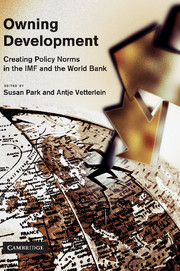Book contents
- Frontmatter
- Contents
- List of figures
- List of tables
- List of contributors
- Preface and acknowledgements
- List of acronyms and abbreviations
- Part One Introduction
- Part Two Norm emergence
- Part Three Norm stabilization
- 5 Lacking ownership: the IMF and its engagement with social development as a policy norm
- 6 Stabilizing global monetary norms: the IMF and current account convertibility
- 7 Bitter pills to swallow: legitimacy gaps and social recognition of the IMF tax policy norm in East Asia
- Part Four Norm subsiding
- Part Five Conclusion
- Bibliography
- Index
7 - Bitter pills to swallow: legitimacy gaps and social recognition of the IMF tax policy norm in East Asia
Published online by Cambridge University Press: 02 December 2010
- Frontmatter
- Contents
- List of figures
- List of tables
- List of contributors
- Preface and acknowledgements
- List of acronyms and abbreviations
- Part One Introduction
- Part Two Norm emergence
- Part Three Norm stabilization
- 5 Lacking ownership: the IMF and its engagement with social development as a policy norm
- 6 Stabilizing global monetary norms: the IMF and current account convertibility
- 7 Bitter pills to swallow: legitimacy gaps and social recognition of the IMF tax policy norm in East Asia
- Part Four Norm subsiding
- Part Five Conclusion
- Bibliography
- Index
Summary
Introduction
As one of the world's premier institutions for global economic governance, the International Monetary Fund (IMF) is responsible for ensuring that its member states can pay their own way in the world economy. Accordingly, tax reform has been a key part of the IMF's mandate and the institution devotes substantial energy to advising its member states on how best to reform their fiscal revenue systems, particularly borrowing member states with loan programme conditions. Unsurprisingly, reforming a domestic taxation system raises a host of political issues, not the least who benefits from the redistribution of tax monies. As such, the IMF has a mixed record of success with tax reform within loan programmes, with 60 per cent of borrowing member states failing to meet their fiscal targets during the 1990s. In general, the IMF's failure rate in obtaining borrowing states' full compliance with reform programmes has increased in the past thirty years from 55 per cent in the early 1970s to 80 per cent in the late 1990s. At the same time, Miranda Stewart (2003) highlights that a ‘remarkable consensus’ or norm has emerged in recent years in the determination of tax policy design (see also Stewart and Jogarajan 2004).
In the past, reform programme failure has been explained by a lack of technical expertise in borrowing states, where the offering of technical expertise has been seen by the Fund as one of its key legitimating devices (Barnett and Finnemore 2004).
- Type
- Chapter
- Information
- Owning DevelopmentCreating Policy Norms in the IMF and the World Bank, pp. 137 - 160Publisher: Cambridge University PressPrint publication year: 2010
- 7
- Cited by



